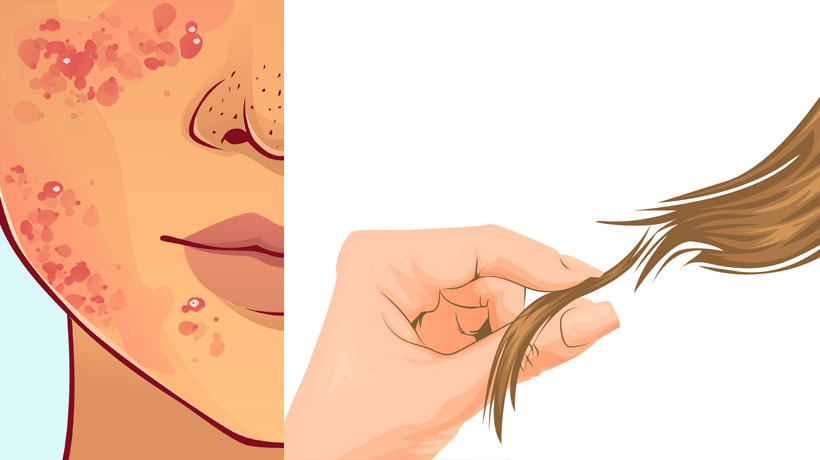Zinc is a crucial mineral for many areas within the body. You might not realize how much you need it until your body develops problems with function and regulation at the cellular level. Zinc deficiencies are rare in America, but they can still happen because of diet. Here are seven sneaky signs that you need more zinc in your diet, as well as the best way to get more.
You’re losing hair
If you’ve noticed more hair than usual in your brush, then a zinc deficiency may be the culprit. While much more common in men, females can also develop bald spots due to a lack of zinc. According to Christine Ruggeri, CHHC of Dr. Axe, “Zinc is an essential co-factor for multiple enzymes and is involved in important functional activities in the hair follicle.” Without zinc, the cells will weaken on your scalp, causing hair to break or fall out from the root. A zinc deficiency can be a component of hypothyroidism, which also causes hair loss.
You get sick more often
If you find yourself getting more than your share of common illnesses like colds and the flu, then you may have a zinc deficiency. Zinc plays a major part in helping your immune system combat bacteria and viruses, creating necessary cells, proteins and lymphocytes. According to the National Institute of Health, “Severe zinc deficiency depresses immune function, and even mild to moderate degrees of zinc deficiency can impair macrophage and neutrophil functions, natural killer cell activity, and complement activity.”
You’re breaking out
Acne has many factors that contribute to its appearance such as bacteria, hormones, diet, poor hygiene and excessive skin oil—but did you know that a lack of zinc can also cause breakouts? Zinc helps the body lower inflammation and smoothen skin. A study conducted in Turkey compared zinc levels with participants who had acne. According to Jooyeon Chae on the results, “Zinc levels trend downwards with increased acne…On average, people with acne have 24 percent lower zinc levels than those without acne.” The more severe your acne, the lower your zinc levels.
Your appetite decreases
If you’ve noticed your appetite getting worse or that food doesn’t taste as good as it used to, then you could be dealing with a zinc deficiency. Zinc can affect your body’s senses, which can cause a decrease in appetite. According to HealthStatus, “It has been noted that some people with anorexia nervosa lose the sense of taste; this links with zinc deficiency as it is known that some people with zinc deficiency have a poor sense of taste (ageusia) and smell (anosmia).” Zinc can also affect your stomach acid production, which reduces your appetite or makes your intestines more sensitive to eating.
Your night vision is poor
If it takes your eyes a very long time to adjust to darkness or if you struggle with night blindness, take notice. According to the American Optometric Association, “[Zinc] plays a vital role in bringing vitamin A from the liver to the retina in order to produce melanin, a protective pigment in the eyes.” Without zinc acting as a transport for vitamin A, your eyes won’t be able to adjust in the dark and they will be more susceptible to sun damage. Over time, if your zinc deficiency worsens, you might develop macular degeneration or cataracts.
You can’t sleep at night
Tossing and turning is usually attributed to insomnia, but a zinc deficiency can also keep you up at night or worsen your sleep quality. Adequate levels of zinc in the blood may shorten the time it takes to fall asleep (sleep latency), increase the overall amount of sleep, and assure sleep quality and efficiency (time spent asleep when in bed).
Your wounds heal very slowly
You uncover your Band-Aid, grimace at the week-old wound on your arm, and wonder why it hasn’t healed yet. If you suffer from a zinc deficiency, then wounds, cuts, and scrapes will take forever to heal. According to a study published in the journal Nutrients on zinc and wound health, “Zinc plays a major role in regulating every phase of the wound healing process; ranging from membrane repair, oxidative stress, coagulation, inflammation and immune defense, tissue re-epithelialization, angiogenesis, to fibrosis/scar formation.” Your skin won’t be able to undergo the repair process if you have a zinc deficiency and your wounds will be more susceptible to bacteria and further damage.
How to get more zinc in your diet
The most important thing to know is that you don’t need to have a ton of zinc to optimize your body; you need the right amount. According to Mayo Clinic, “The recommended daily amount of zinc is 8 milligrams (mg) for women.” If you’re pregnant or breastfeeding, opt for 11 to 12 mg.
Oysters, red meat, pumpkin seeds, pork, chicken, nuts, whole grains, beans, and fortified cereal are all good options for increasing your zinc intake.
Sources:
https://ods.od.nih.gov/factsheets/Zinc-HealthProfessional/
https://draxe.com/vitamins-for-hair-growth/
https://www.acneeinstein.com/zinc-for-acne/
https://www.healthstatus.com/health_blog/wellness/the-effects-of-zinc-deficiency-on-human-health/
https://www.aoa.org/patients-and-public/caring-for-your-vision/diet-and-nutrition/zinc
https://www.psychologytoday.com/us/articles/201807/zzzz-zinc
https://www.ncbi.nlm.nih.gov/pmc/articles/PMC5793244/
https://www.mayoclinic.org/drugs-supplements-zinc/art-20366112



